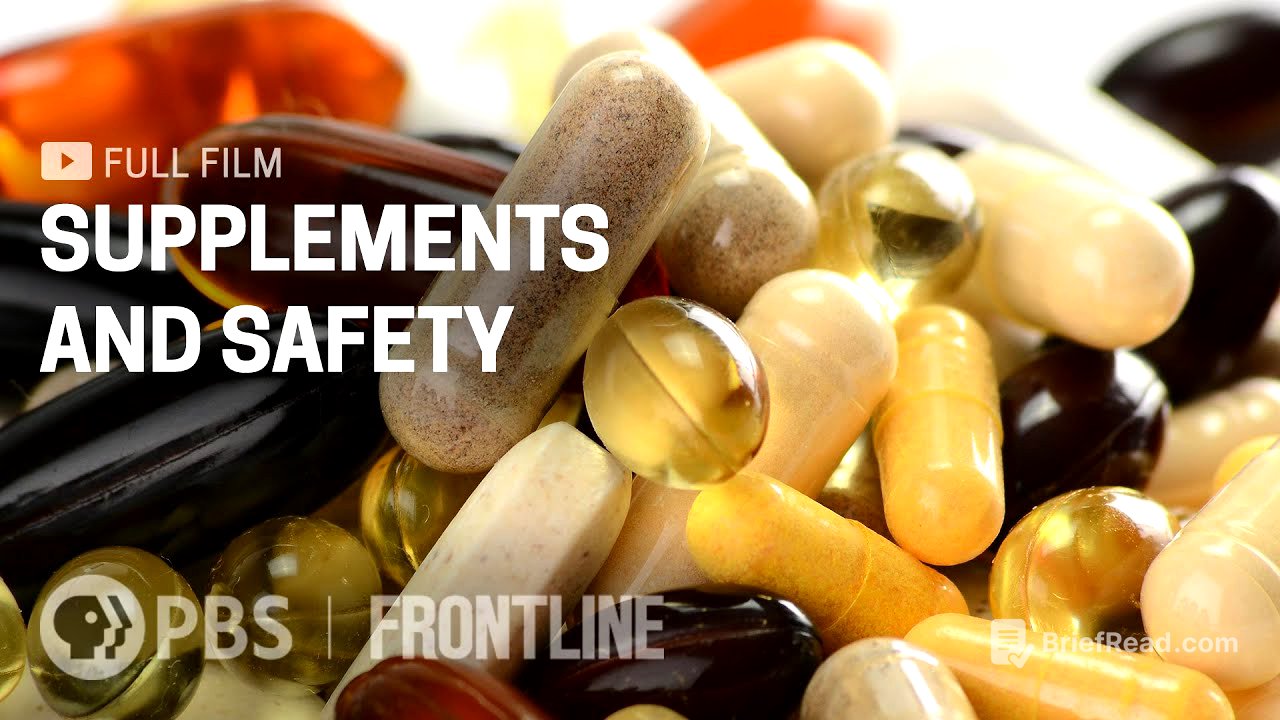TLDR;
This Frontline episode investigates the largely unregulated supplement industry, revealing issues with product safety, efficacy, and labeling accuracy. It highlights the limited oversight by the FDA, the industry's powerful lobbying efforts, and the potential harm some supplements can cause. The report also examines the debate over whether supplements actually work and what consumers should know before taking them.
- Limited FDA oversight allows supplements to be sold without proof of safety or efficacy.
- The supplement industry wields significant political influence, resisting stricter regulations.
- Independent testing has revealed mislabeling, contamination, and the presence of unlisted ingredients in supplements.
- Some supplements have been linked to serious health issues, including liver damage and strokes.
- Experts question the effectiveness of many supplements, with some studies suggesting potential harm from excessive intake.
Prologue [0:00]
The episode introduces the debate surrounding the multi-billion dollar supplement industry, highlighting the claims that supplements can improve health. Critics argue that many supplements make fraudulent claims, may be dangerous, and require stricter regulation. The segment sets the stage for an investigation into the safety and regulation of supplements.
Limited Federal Oversight of Vitamin & Supplement Companies [0:50]
The segment explores the story of Purity First, a supplement company that grew from a small kitchen operation to a half-million-dollar enterprise. Customers like Vinnie Gro experienced unusual symptoms after taking Purity First vitamins, leading to the discovery that the products were laced with anabolic steroids. The FDA's limited resources and lack of a formal registration system for supplement manufacturers hinder its ability to inspect facilities and ensure product safety. The FDA does not review dietary supplements before they are marketed, and manufacturers are not obligated to provide evidence of effectiveness or safety.
The Supplement Industry: A Powerful Lobbying Force in Washington, D.C. [15:49]
The segment discusses the supplement industry's powerful lobbying presence in Washington, D.C., with four separate lobby groups representing their interests. Daniel Fabricant, former head of the FDA's division of dietary supplements and current head of the Natural Products Association, defends the industry and downplays concerns about adulteration. Despite his claims of ensuring product quality, Fabricant acknowledged in a trade association conference that FDA inspections often reveal companies with inadequate testing, standards, and record-keeping practices. The FDA's limited staff of 25 employees for supplement regulation is insufficient to address the widespread issues in the industry.
Critics Contend Some Supplements Cause Harm [31:51]
The segment investigates the potential harm caused by supplements, highlighting the case of Oxy Elite Pro, a diet and workout supplement linked to liver damage. Cynthia Novid, a US Navy officer, suffered liver failure and required a transplant after taking the supplement. Despite reports of liver problems, doctors in Hawaii found the FDA slow to respond. Dr. Herbert Bowski, an investigator with a liver Injury Network, notes a significant increase in liver injuries linked to supplements. The segment also discusses the difficulty in quantifying the harm caused by supplements due to the lack of an effective system for detecting adverse effects.
What's In the Vitamins & Supplements We Take? [44:28]
The segment examines the actual contents of supplements, revealing issues with mislabeling and adulteration. Dr. Steven Newmaster's DNA testing of herbal products found that 60% contained ingredients not listed on their labels, and one in three were outright fakes. New York Attorney General Eric Schneiderman conducted similar tests, finding that only 21% of herbal supplements contained the product listed on the label. The Attorney General demanded that companies stop selling the products, and GNC agreed to use DNA barcoding to authenticate its products. Despite these findings, industry spokesman Daniel Fabricant remains unconvinced and questions the methodology used in the studies.
Credits [51:57]
Credits.









![[ Official Pilot ] Cranium ปริศนาซากมรณะ](https://wm-img.halpindev.com/p-briefread_c-10_b-10/urlb/aHR0cDovL2ltZy55b3V0dWJlLmNvbS92aS9sZ2JRS3pvbGlZNC9ocWRlZmF1bHQuanBn.jpg)